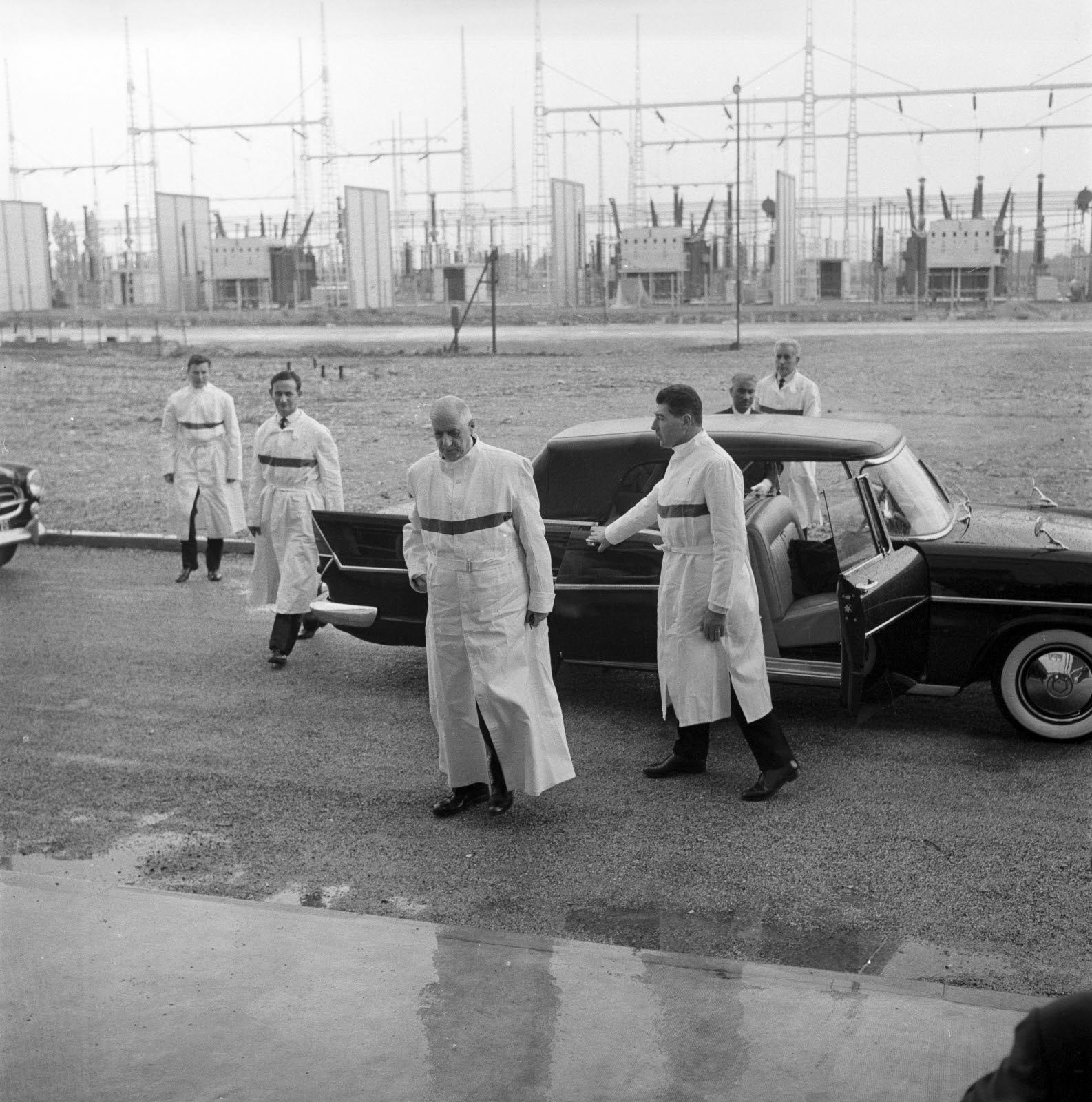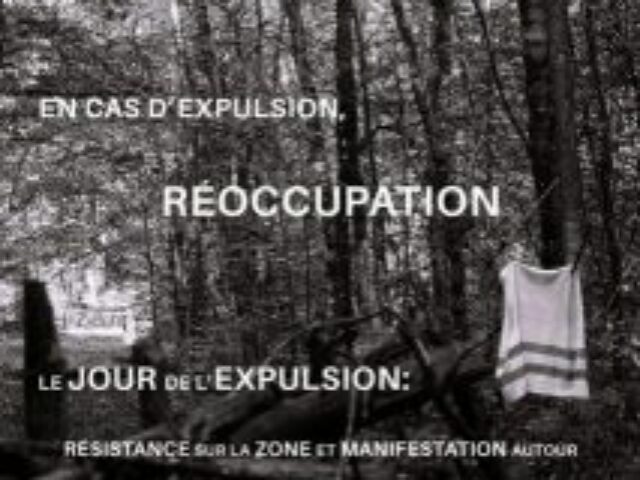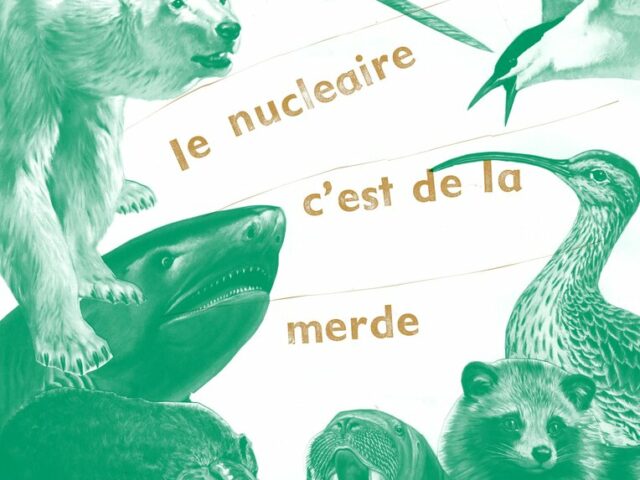“Democratic nuclear energy” doesn’t exist
Nowadays, a deceptive discourse is gaining more and more traction: nuclear power, a so-called “decarbonized” energy, could save the climate. This misleading assertion collapses as soon as this industrial sector in its entirety is examined with a little rigor. However, this current debate should not obscure the other fundamental reasons for opposing this technique. Because it is intimately linked to the production of the most destructive weapons ever conceived, because it is part of a military and colonial order and because it cannot afford the slightest transparency, nuclear power is intrinsically opposed to democracy.
(Article published in a file on nuclear energy by the magazine Nature et Progres of february 2021)
Here is a sentence that has lost none of its revealing power since it was first written in a 1958 WHO report. It states: “from the point of view of mental health, the most satisfactory solution for the future of peaceful uses of atomic energy would be to see the rise of a new generation which had learned to live with ignorance and uncertainty”. Sixty years later, this strange program sometimes seems to have come true. Though nuclear power is the main source of electricity in France (78% of the energy mix), few people think they are able to understand and judge its functioning and organization. Few people are concerned about the health consequences of the facilities that abound in the country, and accidents related to nuclear activity do not cause much of a stir in public opinion when they are revealed. This is because successive governments and their industrial partners have been keen on making the matter unintelligible to the “general public” and to keep them out of it.
The history of the imposition of civil nuclear power in France is therefore that of a double victory over democracy: first, to have made people believe that a technology was so complex that it could not be understood by any common person, and second, to have asserted that its use would therefore not require the population’s consent.
THE MYTH OF THE IMPOSSIBLE DEBATE
But what is so bad about a nuclear power plant? Is it really beyond the average capacity for reasoning, so much so that it cannot be debated? A power plant starts and controls a chain reaction during which considerable energy is released by the fission of different atomic elements. This energy is used to heat water which is transformed into steam, which will then drive a turbine producing electricity.
In other words, an atomic power plant is a gigantic steam engine. The problem is that this chain reaction also produces highly dangerous radioactive elements and must be constantly monitored to avoid a runaway that would lead to an explosion. Finally, this reaction ultimately produces heaps of highly contaminated final waste whose management will burden future generations for thousands of years.
Put in this way, the equation does not seem so difficult. The implications of an electro-nuclear program are no longer limited to an energy option, but rather to a choice of civilization that everyone must be able to make. It was therefore possible to put the question to the population when General de Gaulle created the Atomic Energy Commission (CEA) after the Second World War or during the Mesmer plan for the construction of power plants in 1974. This was the case, for example, in Austria, where a referendum put an end to the country’s atomic pretensions in 1978, even though a first power plant had just been built.
A SOCIETY OF CONTROL AND OPACITY
In France, the choice of nuclear power was made in an authoritarian manner and has therefore created an industry that is perfectly happy with opacity. The power plants, because they involve enormous risks, must be subject to permanent control. It is necessary at all costs to maintain these installations in a stable environment, completely protected from external hazards. Apart from a few “open” days, the 18 sites where the 56 French reactors are located are therefore forbidden zones placed under military surveillance. To approach these installations is to be subject to quasi-automatic control by the gendarmes on duty. At the same time, it is difficult, if not impossible, to know the “health state” of these industrial sites. Such information is not communicated by the operator but is painstakingly brought to light by individuals or anti-nuclear associations, at the cost of endless administrative appeals. And even when forced to reveal internal documents, EDF executives do not hesitate to redact them, manually blacking out entire pages before sending them, illegible, to the citizens who had requested them.
Any slightly frank opposition is also silenced. And when the millions of euros that rain down on the nuclearized regions through subsidies and job promises are not enough to calm the protests, they are suppressed by force. As the “reason of state”, the nuclear industry benefits from all the tools at its disposal to protect itself. In recent years, anti-nuclear activists have been registered, had their houses raided, been prosecuted and convicted for having demonstrated their opposition, notably in Bure in the Meuse region, where it is planned to bury the most radioactive waste 500 meters deep.
However, some might object that the State now provides spaces for discussion to involve the population: the Local Information Committees (CLI) or the various public debates. But these two tools have the same drawbacks. Both are framed to be only consultative spaces, leading one to think that democracy is exercised while the concerns or fears of citizens are swept aside by the words of scientific experts. The same is true for all the legal processes to which the industry is supposed to comply. The derogations, non-conform invitations to tender, truncated public inquiries or infringements to environmental law are innumerable. Each time, the nuclear industry in France shows itself to be above the law, like a state within the state.
 De Gaulle visiting the CEA in 1967
De Gaulle visiting the CEA in 1967
THE UNAVOIDABLE SUPPORT FOR MILITARY NUCLEAR ENERGY
If so-called “civil” nuclear power bathes in the culture of secrecy like a fish in water, it is because it comes from military nuclear power and has never stopped coming back to it. For a long time presented as two quite distinct things, they are in fact two sides of the same ambition. Emmanuel Macron recognized this at the end of 2020 with unprecedented frankness: “Without civilian nuclear power, there is no military nuclear power, and without military nuclear power, there is no civilian nuclear power”. To survive, military nuclear power relies on the entire civilian sector. From uranium mining to reactor technology, from radioactive transport to waste management, and from university training to scientific research, these skills are as useful for submarines, nuclear-powered aircraft carriers and warheads as for lighting bathrooms. The military no longer needs to oversee all of these activities and can maintain its nuclear arsenal at lower cost. Indeed, it is on the basis of its atomic power that France still justifies its place among the decision-making nations, in Europe and in the world.
But if military nuclear power needs civilian nuclear power, the reverse is also true. The example of France’s neighboring countries is quite telling in this respect. In the last ten years, Germany, Belgium and Switzerland have all chosen to abandon the atom as a means of energy production. This has been possible, among other things, because these countries do not possess nuclear weapons. The governments were thus free to decide whether or not to maintain a sector that has been criticized for being dangerous, wasteful and ageing. At the same time, France, whose diplomatic power is based on its atomic strength and on the export of its civilian nuclear power “know-how”, persisted in manufacturing and selling a new generation of reactors, the EPRs, whose only miracle so far has been to manage to swallow more than 19 billion euros of public money (at Flamanville, six times its initial cost) without having produced a single megawatt.
A COLONIAL ACTIVITY
Supposedly, civilian nuclear power at least havs the merit of guaranteeing France’s energetic independence. This is to forget, among other things, the existence of uranium, the vast majority of which is extracted in Niger. Since the 1960s, post-colonial agreements have allowed France to maintain very advantageous mining rights in this country, which is among the poorest in the world. Its army has maintained a regime of vassalage, supporting insurrections, putschists and candidates for elections. Far from Paris and its technocrats who praise clean, low-carbon energy, Orano (formerly Areva) reigns in the Nigerian desert over a city created from scratch around its two mines. For France, the indispensable ore. For the people of Niger, poor working conditions, radioactive pollution and cancer. Wherever it is deployed, nuclear power advances with arrogance and contempt for the population. It hides its military ambitions behind energy concerns and colonizes territories, in France and abroad. It only values the word of experts and prevents any collective involvement in decision-making. Its inherent dangers require a policy of secrecy that supports a securely centralized order. By its very nature, nuclear power is therefore the opposite of democratic ideals, peace and equality between peoples. If it is a choice of civilization, there is still time to refute it.
Riri, Fifi, Loulou,
struggling against the waste burial at Bure
24/04/2021
Et sinon, 37 jours avant
on écrivait ça.

Arlon: the Zablière evicted
Early this monday morning, March 15, the forces of disorder evicted the zadists present in the area. The Arlon police mobilized last night with the support of the federal police on the outskirts of... Lire la suite
Et sinon, le lendemain
on écrivait ça.

AUTOMEDIA Sessions the 15-16 May 2021
Whether it is for big events or on a daily basis, practicing automedia in a collective manner is useful to : Produce ourselves the information we want to, withouth depending upon the traditional me... Lire la suite
25/04/2021